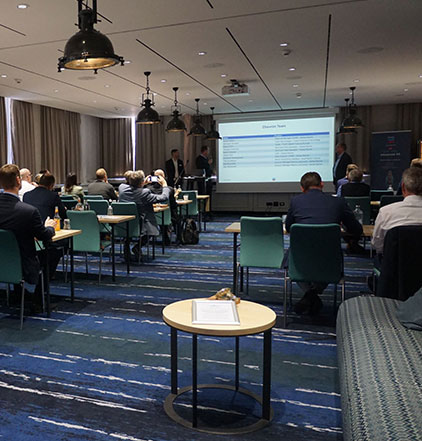chevron outlines lower carbon marine fuel pathways at hamburg seminar
Chevron Marine Products has set out its vision for the future of marine fuels and lubricants during a technical seminar held in Hamburg, Germany, as part of a global series of events designed to engage customers, share technical insights, and encourage industry collaboration on emerging marine energy solutions.
Hosted by Sotiris Meklis, Chevron’s Regional Manager Marine Lubricants, the Hamburg seminar addressed the operational and regulatory challenges facing vessel operators as the shipping sector moves towards lower-emission energy sources.
Presentations covered the latest updates to marine fuel standards, the growing role of biofuels, and developments in engine lubricants to support the use of alternative fuels.
Marine fuel standards revised as alternative fuels emerge
Chevron’s fuels specialist, Monique Vermeire opened the event with an overview of ISO 8217:2024, a newly revised marine fuel specification that reflects the increasing uptake of renewable and synthetic fuel sources.
The latest revisions broaden the scope of permissible fuel types, introducing clearer definitions for blends containing fatty acid methyl ester (FAME), hydrotreated vegetable oil (HVO), and other renewable components. It also includes detailed testing and labelling criteria for distillate and residual marine fuels.
“The revision of ISO 8217 in 2024 is a very significant update,” said Vermeire. “It supports the shipping industry’s transition towards using fewer fossil fuels and more fuels from renewable sources.”
Vermeire also discussed a companion standard, ISO 6583:2024, for methanol. As interest builds around methanol as a low-carbon fuel option, this standard establishes formal guidance on purity, density, lubricity, and contaminants, aimed at ensuring consistency and safety in marine applications.
Biofuels gain ground, but challenges remain
Jakub Egger-Czerwoniuk, from the classification society, DNV, took to the stage to examine the role of biofuels in the fuel mix. He told delegates that while biofuels currently account for a small proportion of marine energy use, demand is increasing in line with regulatory measures such as the European Union’s FuelEU Maritime initiative.
“Biofuels are not a silver bullet, but they are one of the most accessible options available now,” he said. “The voluntary market is currently the main driver in shipping.”
Ports such as Rotterdam and Singapore have seen a sharp rise in bio-blended bunker sales over recent years. However, Mr Egger-Czerwoniuk also noted that the environmental benefits of using biofuels depend heavily on proper certification and documentation. Operators must retain records including Proof of Sustainability and emissions data to claim compliance with international climate targets.


Lubricants evolve to meet changing engine demands
Chevron’s technical specialists, Martin Roessner and Georgia Chaloulou, presented findings from lubricant testing programs on engines running alternative fuels. Their presentation focused on how many lubricants are being reformulated to support operational efficiency and reduce maintenance costs as vessel engines adapt to new combustion properties.
The company’s latest formulation, Taro® Ultra Advanced 40, has been tested in dual-fuel and methanol-fueled engines and was shown to offer high piston cleanliness and low wear, even at reduced oil feed rates.
“With Taro® Ultra Advanced 40, you can streamline operations and reduce the need to alternate between 40 and 100 BN oils,” said Roessner. “It also helps to lower complexity and cost.”
Chevron also introduced HDAX® 9700, a medium-speed engine oil that has been tested on LNG, biofuel and methanol applications. The product is currently undergoing OEM evaluations for ammonia-fueled engines, which remain in early development stages.
Fuel supply network expands to support lower-carbon uptake
Chevron’s Pierre Pirrin, Trader, Product Supply & Trading, Europe provided an overview of the company’s marine fuel infrastructure. He said Chevron is now one of the top two suppliers of marine biofuels globally, with a fully integrated supply chain operating in Singapore, and refineries located across the United States.
“We are not only supplying marine fuels, we are embedding solutions for insetting and carbon offsetting directly into the bunker delivery process,” Mr Pirrin told delegates.
He added that expansion into the Amsterdam-Rotterdam-Antwerp region and the Mediterranean is underway, aimed at increasing the availability of lower-carbon fuels in major bunkering hubs.
Collaboration seen as key to managing complexity
The seminar also featured remarks from Dr Ing Jürgen Binder of engine maker, WinGD, who provided an update on dual-fuel engine designs suited to methanol (X-DF-M) and ammonia (X-DF-A). His comments highlighted the importance of aligning engine development with compatible fuel and lubricant solutions.
Chevron said the Hamburg seminar is part of its commitment to supporting customers with technical knowledge and practical tools as the industry transitions towards lower carbon fuel options. Similar Chevron Insight Seminars have taken place across various regions, with more planned over the coming months.
As Mr Roessner concluded, “It’s about empowering our customers with data-backed insights and giving them confidence in their next operational decision.”
